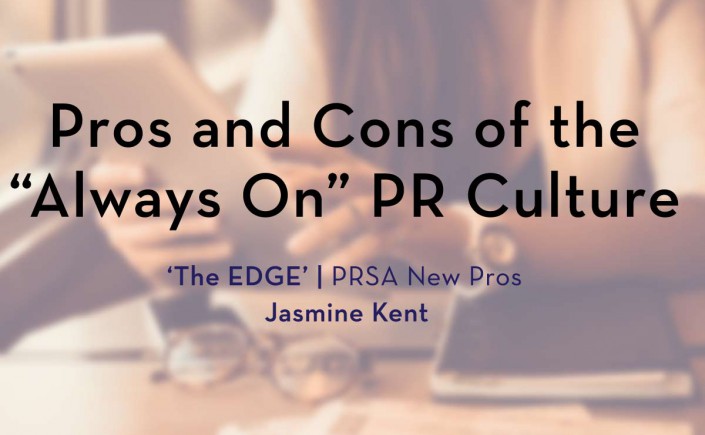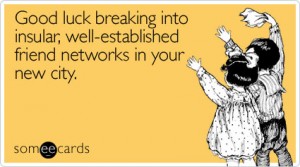By the time you graduate college, you’ve finally figured out how to manage your homework, extracurricular activities, part-time job, internship and social life – and squeeze in those precious hours of sleep! But now you have graduated and landed a post-grad internship or full-time job. So now what?
It’s like the first day of school all over again. You walk in on your first day of work, not knowing a soul besides the person who interviewed you. Therefore, you tend to be quiet the first day as you soak in every valuable piece of information while trying to prove that you are the right person for the job. By the end of the day, your work still isn’t over. There are plenty more responsibilities that come with post-college life including paying for rent, bills and groceries. And on top of that, you must consider paying for your phone bill, car insurance and maintaining a social life. The list goes on and on.
To achieve a sense of balance in this critical launch-pad phase of your career, take into consideration some of the suggestions and advice that I’ve found helpful in my own post-graduate adjustment:
1. Be realistic about your income.
 Balancing your checkbook is a major responsibility of balancing your life after college. Money will not necessarily make you happy; however, I know we all want to avoid being in debt, so be smart with your first big-kid paycheck.
Balancing your checkbook is a major responsibility of balancing your life after college. Money will not necessarily make you happy; however, I know we all want to avoid being in debt, so be smart with your first big-kid paycheck.
One of the first pieces of advice I received as a new college grad was from my father, who is a financially savvy banker. He suggested that I make a spreadsheet consisting of all my monthly expenses, and I encourage you to do the same. This practice will help you track how much money you are earning, especially after taxes, and where all of your money is going. Therefore, you can see where you may need to cut back on spending in order to save a few more dollars.
Also, if you know you will be working with your company for more than a year, consider living close to work in order to save on gas. Most apartment complexes have one-year leases, and if you do your research, you can find some manageable deals out there. If it’s possible, consider living with your parents or a roommate while you get your feet wet, but remember not to get too comfortable.
2. Find other like-minded professionals with whom to connect.
As a new graduate, it can be hard to adjust to being away from the group of friends that was constantly at your side back in college. One way to make new friends and critical networking contacts is to join organizations that connect you with young professionals like yourself.
If you’re a member of PRSA, you’re already ahead of the game. PRSA New Professionals Section is a great way to meet peers and share ideas, experiences and similar life/work situations across the country.
Another opportunity to seize is your local alumni association. Your membership will most likely cost a small fee, so remember to include that fee in your budget and maybe eat out less that week in order to balance the cost.
3. Get active and involved in your community.
Aside from professional organizations, start connecting with the community in which you live, whether it’s brand new or one where you’ve lived for a while. The chamber of commerce is generally a great place to start. The chamber often has a directory that is open to the public, and the staff can usually point you in the right direction based on your interests.
Get outdoors, get active and exercise! Is there a local gym with great rates you can join? Is there a park through which you can walk or run each morning before starting your workday? Working out in the morning can take some discipline at first, but it will increase your productivity throughout the day (and make you feel less guilty for enjoying your latte from Starbucks!).
4. Don’t set yourself up for burnout.
You’re ready to prove yourself to the world, but don’t try to accomplish everything at once or you may end up overwhelming yourself. Take on one or two tasks at a time and learn how much you’re comfortable with managing. No one expects you to be running the office immediately. Failures and successes are all a part of the learning process that makes you a better human and a better professional.
5. Make time for yourself.
 Enjoy a drink at happy hour. We all deserve an opportunity to kick back after a long week at work. Plus, it never hurts to get to know your coworkers outside of the office. Above all, take time for yourself. It can be easy to get caught going 100 miles per hour five days a week, especially when public relations isn’t the traditional nine-to-five job. What hobbies and interests gave you joy in school? Find ways to work those hobbies into your weekly schedule. This time doesn’t detract from your professional commitments; rather, it can give you the energy and passion to continue excelling at your work.
Enjoy a drink at happy hour. We all deserve an opportunity to kick back after a long week at work. Plus, it never hurts to get to know your coworkers outside of the office. Above all, take time for yourself. It can be easy to get caught going 100 miles per hour five days a week, especially when public relations isn’t the traditional nine-to-five job. What hobbies and interests gave you joy in school? Find ways to work those hobbies into your weekly schedule. This time doesn’t detract from your professional commitments; rather, it can give you the energy and passion to continue excelling at your work.
Good luck!
 Whitney Strittmatter is an office coordinator at the Jason Ridley Agency, Nationwide Insurance. As an office coordinator, she is responsible for organizing and attending local events, engaging the media across multiple social media platforms, developing content and managing the agency’s day-to-day operations. She graduated from the University of Oklahoma in 2013 with a degree in public relations. Strittmatter is a proud member of the PRSA Dallas Chapter and can be contacted at whitstritt@gmail.com or found on LinkedIn and Twitter.
Whitney Strittmatter is an office coordinator at the Jason Ridley Agency, Nationwide Insurance. As an office coordinator, she is responsible for organizing and attending local events, engaging the media across multiple social media platforms, developing content and managing the agency’s day-to-day operations. She graduated from the University of Oklahoma in 2013 with a degree in public relations. Strittmatter is a proud member of the PRSA Dallas Chapter and can be contacted at whitstritt@gmail.com or found on LinkedIn and Twitter.
 Jasmine L. Kent, a member of PRSA-LA, is a fan of all things food and beverage, pop culture, and media. Combining all three passions, Jasmine builds community through engaging online marketing and dynamic events as a communications professional in Los Angeles, CA. Keep up with her on Twitter at @LoveJasPR or visit LoveJasPR.com.
Jasmine L. Kent, a member of PRSA-LA, is a fan of all things food and beverage, pop culture, and media. Combining all three passions, Jasmine builds community through engaging online marketing and dynamic events as a communications professional in Los Angeles, CA. Keep up with her on Twitter at @LoveJasPR or visit LoveJasPR.com. 


 I wandered but never faltered, and always felt like I was exactly where I needed to be. I know a lot of young professionals don’t feel that way. Maybe PR wasn’t even your first choice. Some of the best PR pros I know fell into the industry by accident.
I wandered but never faltered, and always felt like I was exactly where I needed to be. I know a lot of young professionals don’t feel that way. Maybe PR wasn’t even your first choice. Some of the best PR pros I know fell into the industry by accident. Audrey LaBenz is a freelance marketing and public relations consultant from Los Angeles, CA. She earned her bachelor’s degree from Cal State Long Beach in 2013 and has been working PR since 2009. She spends most of her off time designing costumes, hiking with her dogs and learning to spin flaming objects.
Audrey LaBenz is a freelance marketing and public relations consultant from Los Angeles, CA. She earned her bachelor’s degree from Cal State Long Beach in 2013 and has been working PR since 2009. She spends most of her off time designing costumes, hiking with her dogs and learning to spin flaming objects.  March is Women’s History Month. I wanted to get inspired, so I decided to read Sheryl Sandberg’s,
March is Women’s History Month. I wanted to get inspired, so I decided to read Sheryl Sandberg’s,  Emily Suied is a public relations professional in Chicago. She is a member of PRSA Chicago and serves on the Young Professional Network committee. Emily graduated from the University of Texas at Arlington and was the president of its PRSSA chapter. Connect with Emily on her
Emily Suied is a public relations professional in Chicago. She is a member of PRSA Chicago and serves on the Young Professional Network committee. Emily graduated from the University of Texas at Arlington and was the president of its PRSSA chapter. Connect with Emily on her 



